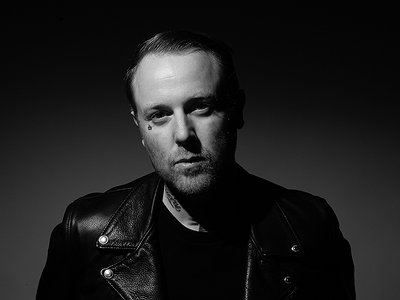Name: Sian / Graham Goodwin
Nationality: Irish
Occupation: Producer, DJ
Current Release: X-Rays with Marc Houle [as Marsian] on Octopus
Recommendations: Pale Fire by Vladimir Nabokov, and Just 6 numbers by Martin Rees. You will get lost in these…
Website / Contact: If you enjoyed this interview with Sian, make sure to visit his website and facebook page for more information.
When did you start writing/producing music - and what or who were your early passions and influences? What is it about music and/or sound that drew you to it?
Electronic music has always intrigued me, I started listening to a lot of machine based music in the 80’s growing up and found something really captivating about it. Anything that was made with a drum machine or weird synthy sounds and effects really is what turned me onto wanting to create that type of stuff. When I was younger it was less about creating a certain type of music or genre, but more experimenting with sounds. I was probably about 16 when I first realized that I really wanted to start producing music and from there I kind of blazed my own path forward.
For most artists, originality is first preceded by a phase of learning and, often, emulating others. What was this like for you? How would you describe your own development as an artist and the transition towards your own voice? What is the relationship between copying, learning and your own creativity?
I spent a lot of time in the beginning figuring out what I wanted my overall sound to be, and I didn’t start releasing music until I had really dialed that in. I always kind of had a renegade outlook on my own productions, straying from the typical dance music that was out there. In fact, I started my label Octopus in order to conform less to what was out there and be able to have more freedom to write the music that I felt fit my signature sound. I think of course we are all re-creating sounds, patterns, rhythms that have been done before, but it’s what you do with them that really sets someone’s sound apart. I’ve always been really into stripping music back to the bare-bones elements and finding the most powerful parts to build on. I feel finding your own voice comes from a lot of trial and error and experimentation in the studio. For me breaking the rules of specific genres or what defines a top selling track and going with what feels and sounds good to me are some of the most important parts. I think that’s why Marc Houle and I clicked so well for this Marsian project we’ve been working on. We both don’t really conform to what’s out there in the techno realm and have always made some really trippy, spaced out music.
What were your main compositional- and production-challenges in the beginning and how have they changed over time?
I guess in the beginning it was finding that specific style and sound I wanted to roll with. But as time goes on, I think one of the most important challenges to overcome is overthinking the music or not letting it take its own shape. People get so hung up on making something that sounds one way or another, but if you just start out with a few of the basic elements and get those to a really solid sounding point, then let any extras fall into place.
It’s easier to not start overanalyzing what you’re making.
What was your first studio like? How and for what reasons has your set-up evolved over the years and what are currently some of the most important pieces of gear for you?
I started off using a lot of Moog synths and a Korg MS20 in the beginning, focusing on getting to know the ins and outs of them really well. Taking the time to learn to use them allowed me to get some really grimy sounds out of them that I used in a lot of my earlier productions. Over time I began traveling more and moved around quite a bit, so lugging all of the analog gear with me everywhere wasn’t so logical. Currently I’m running more of a stripped down studio using Ableton and a collection of VST’s. I’ve integrated the Ableton Push and Native Instruments Maschine into my studio setup and it’s really working out nicely right now.
How do you make use of technology? In terms of the feedback mechanism between technology and creativity, what do humans excel at, what do machines excel at?
I think the unpredictability of machines helps us to create some of the most interesting music and has allowed electronic music to get to where it’s at today. There’s a certain element of machine made music that’s so exciting simply because it’s almost an entity of its own. That said, relying too much on machines to create a human feel to music I think leaves a void in a track and can get boring or stagnant. I think humans excel at making people feel something when they hear a specific piece of music. We can take all of the machine made elements and twist them into something that’s hypnotic and exciting for people to listen to. It’s more than just stringing together some sequences or loops. You’ve gotta give it that underlying groove, and almost some imperfect human characteristics to really make something dynamic.
Production tools, from instruments to complex software environments, contribute to the compositional process. How does this manifest itself in your work? Can you describe the co-authorship between yourself and your tools?
I always try to first lock in the main elements that I know work, then I start experimenting with some sequences and weirder elements and see what shape they take as I work with them. Sometimes the strangest ideas come from a sample or sound I heard in a movie or everyday life. If you take that and toss it around in some software suddenly you’ve got something that makes a main element of a track. I guess on my end it’s looking for inspiration and ideas everywhere, and once I get them into the computer or software then they take on a new shape which I then can take in many directions. I think that’s one of the most exciting parts about electronic music and what I’m doing with Marc for our Marsian project. We toss back and forth ideas and can really just go any which direction we choose to make some really cool and futuristic stuff.
Collaborations can take on many forms. What role do they play in your approach and what are your preferred ways of engaging with other creatives through, for example, file sharing, jamming or just talking about ideas?
Really it’s great to be able to kick ideas back and forth with other artists no matter what genre they’re involved in. My last album allowed me to collaborate with some really forward thinking artists in the hip hop realm and I decided I wanted to do some more collaborations after that. Collaborations have always been exciting to me sharing ideas and music with others and getting their perspective on it is really rewarding, everyone hears something a bit different in music. When Marc and I started sharing ideas for tracks over the last year we had an instant connection for the weird stuff we were each creating and we were able to make some really forward thinking, out of this world music.



